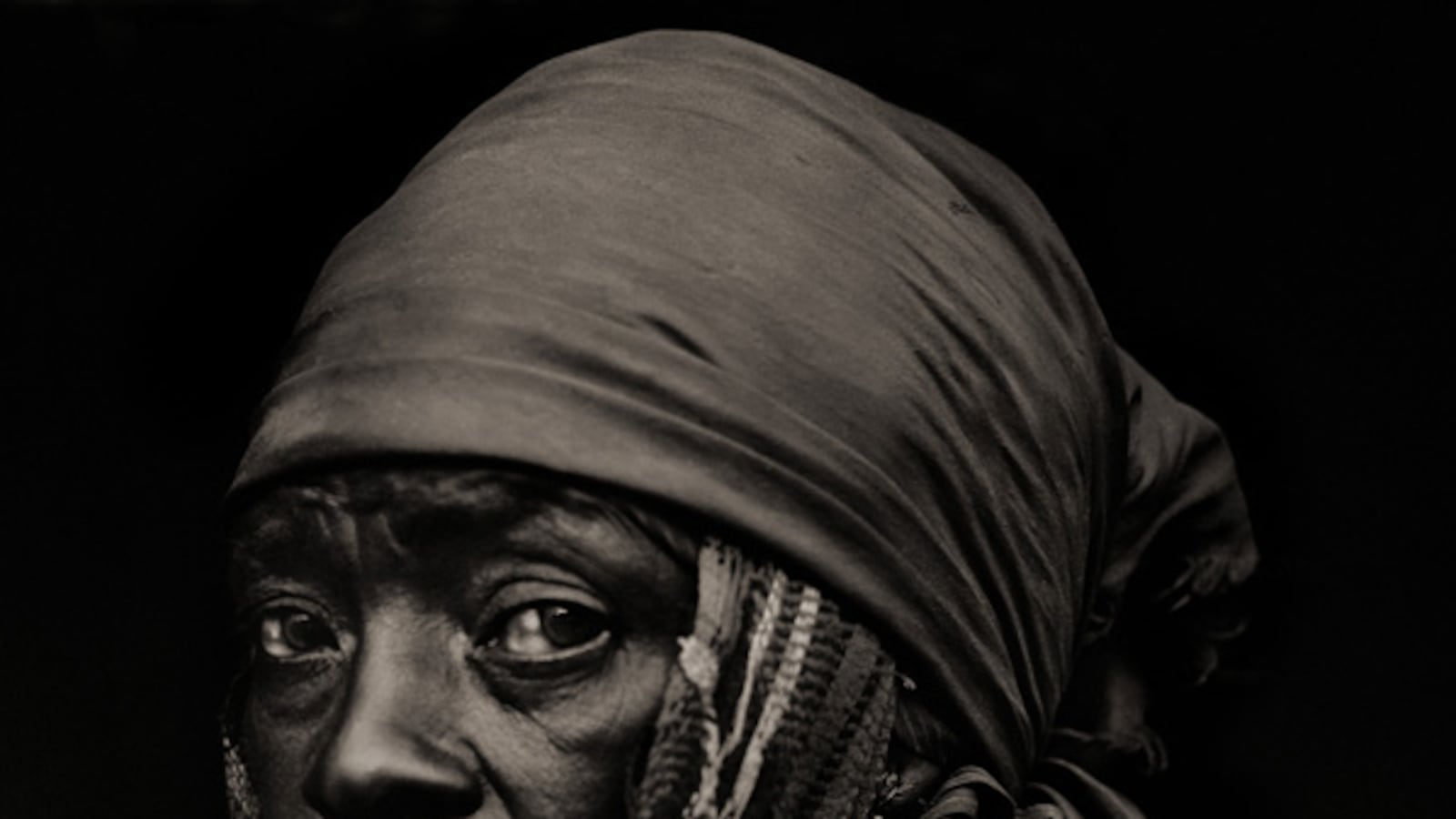
Photographer Dana Gluckstein began what would become a 30-year obsession with indigenous populations shortly after graduating from college. She first went to Haiti, where she met with a traditional medicinal plant healer in 1984. She compiled these photos into a book called DIGNITY, which is now a traveling exhibit supporting a campaign in association with Amnesty International for Native American Heritage Month. She hopes that the retrospective of her life's work, with its focus on native populations across the world, will also help shed light on a domestic issue plaguing indigenous communities: sexual violence against Native American women.
Though the United States has pledged to protect the rights of indigenous populations, not enough has been done to battle the devastating fact that one in three women are assaulted or raped on American reservations. Gluckstein and Amnesty are pushing President Obama to enforce protocols that were adopted into law four years ago. They will allow access to emergency contraception, rape kits, and other standard assistance.
"Let’s begin to make those bridges," Gluckstein says. "We are not different: Native American women were the first people of our country, they’re the closest, most connected to earth traditions, matriarchy and power. What could happen when women stand up [for them] and stand as one?"
Dana Gluckstein
In 2010, Gluckstein began campaigning with Amnesty to encourage the United States to adopt the United Nations Declaration on the Rights of Indigenous People. When President Obama agreed, the photographer comprehended the power of her work. Now, she's hoping an exhibition of her life's work, which will travel the country for three or four years beginning in the U.S. at Boston University Art Gallery on January 29, 2015, can once again create tangible change.
But what she's seen in the last few years, as issues of sexual violence have caused heated debates in Washington, hasn't been entirely comforting. "If we aren’t committed to the women protecting us in the military, and aren't committed to our own children on college campuses, how can we ever commit to safety of indigenous women, who are always treated as the low of low, are the poorest on planet and in our own country?" she asks.
Changes may be slow to catch on, but the widespread nature of this issue has the potential to unite a larger population than would typically advocate for native issues. "Social movements have to do with people recognizing we are one and we are connected." Rape, she says, connects people of all races and socio-economic classes. "If I am a well-educated, upper-middle class women living in L.A. and I’m worried about sending my daughter to college—that connects me with knowing what’s facing all women."
This image was shot by Gluckstein in Kenya in 1985.
Dana Gluckstein
Gluckstein has traveled the world, but now she's focusing on the homefront. Last year, she went to New Mexico to shoot portraits of various tribal elders. "A whole new chapter of my life is opening," she says. "I feel I can't talk about indigenous issues as a non-native white woman if I don't act right away."
Here, a young boy sits outside at a religious festival in Bhutan in 2010.
Dana Gluckstein
After working in dozens of countries for the past three decades, Gluckstein was surprised to find how disconnected Americans are from their country's forebearers compared to the other places she's worked. "I think very few people feel at all connected to indigenous roots—in fact we celebrate Columbus Day," she says. "It’s not their fault, I think we haven’t done our homework and our government hasn’t enforced it in history books, so children are not learning that."
Native girl in Fiji, 2008.
Dana Gluckstein
During her time in Kenya, Gluckstein would spend all day in the bush, photographing tribal people. She would return to the safari camps and other visitors would ask what animals she had spotted in the wild. "I never thought about going on safari," she says, "I was always drawn to the people."
This Masai warrior initiate was photographed in 1985.
Dana Gluckstein
"I realized my life would be tracking the voice of what I called 'The Ancient Ones.' I like to say the ancient ones were people fighting for land, tradition and their very lives," Gluckstein says. "They are people who tell us where we come from and where we must go. I've really come to find humanity's survival depends on how carefully we listen."
A row of school boys in Bhutan, 2010.
Dana Gluckstein
"These photos are the doorway into the heart and soul, into voices of people not often heard in western media. They are the voices of our future and how we will steward our planet in the future," she says.
Samburu Women in Kenya, 1985.
Dana Gluckstein
Masai Warrior Initiate in Kenya, 1985.
Dana Gluckstein
Quechuan Children in Peru, 2006.
Dana Gluckstein
Keeper of the Hopi Prophecies, Gathering of Spiritual Leaders in England, 1987.
Dana Gluckstein
Dancer, Navajo Tribe in Arizona, 2012.
©Dana Gluckstein 2013
Tewa Dancer, Ohkay Owingeh in New Mexico, 2013.
Dana Gluckstein
Himba Man, Namibia in 2007.
Dana Gluckstein
Chanter with Tears in Hawaii, 1996.
Dana Gluckstein
Herero Woman in Namibia, 2007.
Dana Gluckstein
Traditional Dancer with Crown in Bali, 1988.
Dana Gluckstein
Aboriginal Artist in Australia, 1989.
Dana Gluckstein
Oren R. Lyons, Faithkeeper, Turtle Clan, Onondaga Nation in the United States, 2009.
Dana Gluckstein
Three Generations of San Women, Xai Xai in Botswana, 2009.
Dana Gluckstein
"I think that our indigenous peoples are always telling us to listen deeply and be together, and certainly as women we know it best. We know the meaning of life better than anyone. When we allow the rape and desecration of women, we allow the descrecation of our planet," says photographer Dana Gluckstein, pictured here in Botswana.
Tai Seeff





